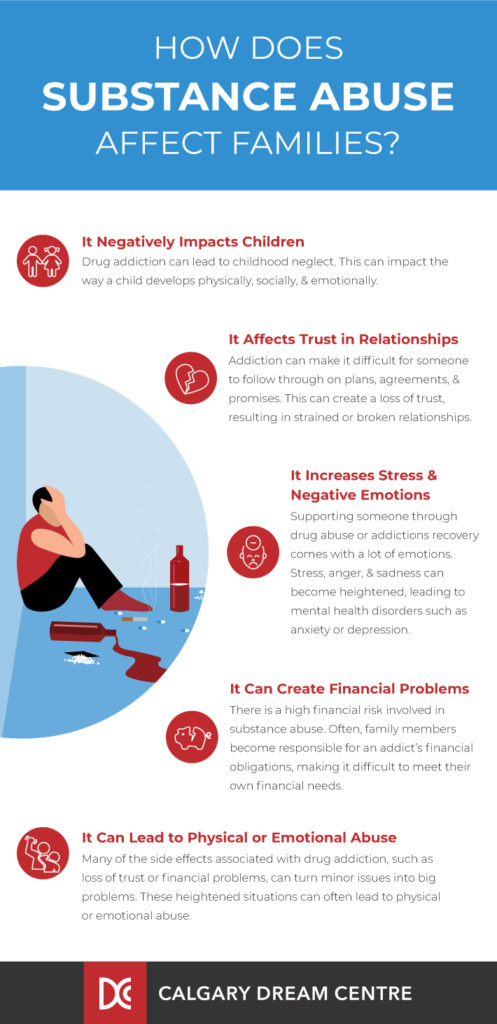Battling a substance use disorder is difficult for everyone involved. Although recovery is often viewed as a personal experience, substance use disorders can have devastating effects on friends, spouses, children, and parents.
Friends and family members play an important role in recovery, but it can be a difficult journey. Unfortunately, time and time again, we see the struggle that relatives endure when their loved one is in a recovery program.
If addiction is affecting your family, know that you’re not alone. At the Calgary Dream Centre, we are dedicated to providing the family support you need.
Keep reading to learn more about the 5 ways substance use disorders affect families and what you can do to strengthen and regain your family connections through addiction.

The 5 Ways Drug Addictions Affect Family Members
In some cases, the effects of a substance use disorder can be short-term, but often there are long-lasting repercussions. For example, families can experience conflict, family division, and loss of trust, causing even the most loving homes to endure emotional trauma.
Impact on Children
If a parent is battling an addiction or substance abuse problem, they may not be able to meet their children’s needs. This can significantly affect the way a child develops socially and emotionally.
Unfortunately, studies have shown that roughly 20% of children grow up with a parent who abuses one or more substances. This can be especially difficult for children who grow up in a single-parent household and have no other role models to turn to.
In addition to the effects on a child’s emotional and mental health, research has also shown that substance abuse in the home can lead to:
- An increased risk of physical and emotional child abuse
- A higher chance of the child abusing substances themselves
- A negative impact on a child’s self-confidence and health
Loss of Trust
Loss of trust is a common side effect that family members experience when one of their loved ones has a substance use disorder.
A drug or alcohol addiction can make it difficult for someone to follow through on plans, agreements, and promises. Over time, this can strain any relationship, whether it’s a sibling, a child, or a romantic relationship.
Loss of trust can:
- Make it difficult to form bonds
- Cause breakups or divorce
- End lifelong friendships

Increased Stress
If someone is supporting a loved one through a substance use disorder, it’s no surprise that the emotional stress they deal with can become overwhelming.
Whether it’s taking over daily duties or making big decisions, a family member often ends up taking on the responsibilities that come second to their addiction.
For a family member, this can:
- Cause them to put their own responsibilities second
- Put them at a higher risk of developing mental health disorders
- Inhibit them from properly taking care of themselves
Financial Problems
Substance use disorders can cause significant financial strain for both the individual struggling with the disorder and their families.
Paying for an addiction can be pretty expensive by itself, but it can also result in financial issues in other ways. If someone has a substance use disorder, they may experience:
- Loss of income
- Legal costs
- Healthcare costs
These costs can make it difficult for an addict to meet other financial obligations, and family members often end up paying bills and other necessities to keep their loved one afloat.
This can lead to financial problems for family members who have less money to pay for their own financial needs, such as food, clothing, utilities, and rent or mortgage.
Physical or Emotional Abuse
Unfortunately, many of the side effects associated with drug addiction can lead to physical or emotional abuse. With heightened emotions and increased stakes, even the most minor disagreements can result in explosive fights.
In situations like these, anyone involved, even the individual abusing drugs, can become a victim of abuse.
Re-establishing Family Connections
If drug addiction is affecting your family, and you don’t know what to do, this is the place to start.
The most important thing you can do for yourself and your loved ones is to seek professional help.
First, encourage your loved one to seek treatment. An intervention using a therapist can help your loved one see how their addiction is affecting their lives and the lives of their family members.
We also suggest seeking counseling for every family member affected by the addiction. A counsellor can help you work through emotional issues and highlight potential solutions.
No matter what, know that you’re not in this alone. Getting help gives your family a better chance of rebuilding positive relationships and can give everyone the support they need to move forward.
Looking for a Place to Start?
If you or a loved one struggles with a substance use disorder, please reach out to us at the Calgary Dream Centre. We are always here to help you start your journey to recovery.



